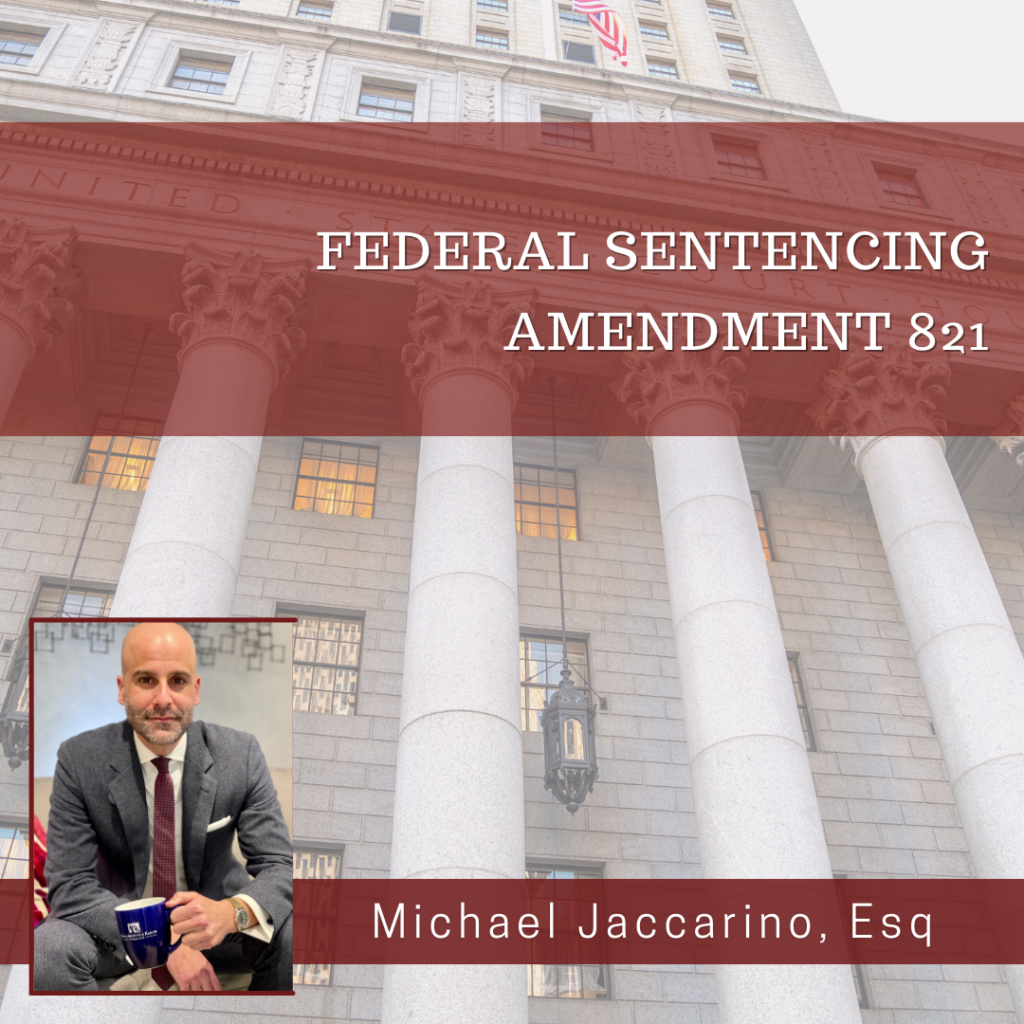ON BEHALF OF MICHAEL JACCARINO, ESQ. OF AIDALA, BERTUNA & KAMINS, PC POSTED IN BLOG ON WEDNESDAY, JANUARY 3, 2024
#ABKLaw BLOG by Michael Jaccarino: Federal Sentencing Amendment 821
Federal Sentencing Amendment 821 – Shakeup by the Federal Sentencing Commission Could Spring Inmates From Federal Prison:
What if I told you that a new Amendment could dramatically reduce prison sentences for inmates serving significant time in federal prison, and the only requirement is that the inmates’ conviction must have been their first conviction?
For many inmate and criminal defense attorneys (including myself), it almost sounds too good to be true. First, a quick primer on how the Federal Sentencing Guidelines work:
The sentencing guidelines take into account both the seriousness of the offense and the offender’s criminal history. The sentencing guidelines provide 43 base levels of offense seriousness. Each type of crime is assigned a base offense level, which is the starting point for determining the seriousness of a particular offense. More serious types of crime have higher base offense levels (for example, a trespass has a base offense level of 4, while kidnapping has a base offense level of 32). Then, specific offense characteristics are added to the base offense level, which vary from offense to offense, but can increase or decrease the base offense level and, ultimately, the sentence an offender receives.
Next, adjustments are added or subtracted. Adjustments are factors that can apply to any offense, such as the age of the victim, the offender’s role in the offense, whether the offender was a minimal participant or a leader in the offense, and obstruction of justice, among many, many others.
The final offense level is determined by taking the base offense level and then adding or subtracting from any specific offense characteristics and adjustments that apply. The point at which the final offense level and the criminal history of the offender intersect on the Sentencing Commission’s sentencing table determines the defendant’s sentencing guideline range, or more importantly, the number of months in federal prison.
On April 5, 2023, the Sentencing Commission announced that it had “voted … to promulgate amendments to the federal sentencing guidelines.” Those amendments, more commonly referred to as “Amendment 821” or the “2023 Criminal History Amendment,” were submitted to Congress on May 1, 2023. Among other things, Amendment 821 “revis[ed] guidance provided to courts regarding people facing their first federal conviction.” Specifically, the Sentencing Commission sought “to reduce recommended guideline ranges for offenders with zero criminal history points under the guidelines (‘zero-point offenders’)….” To do so, “Subpart 1 of Part B of the amendment create[d] a new Chapter Four guideline at §4C1.1 (Adjustment for Certain Zero-Point Offenders)” that “provides a decrease of two levels from the offense level for offenders who did not receive any criminal history points and whose offense did not involve specified aggravating factors.
In simple terms, if there are no aggravating factors, and this is the offender’s first offense, they get an automatic 2-point reduction. This is monumental, as many federal offenders DO NOT have prior criminal convictions. More importantly, a decrease of two levels can have an enormous impact on sentencing, often lowering the sentencing range by many months, if not years. In fact, it has been estimated that this Amendment will affect 11, 495 inmates!
Now, here is where it gets interesting, Amendment 821 is retroactive, meaning it is equally applicable to someone who will be sentenced tomorrow as it is to an incarcerated offender who was sentenced in 2022. This means that all incarcerated offenders should be seeking, ideally with the assistance of an experienced federal criminal defense attorney, to assess whether they qualify for this 2-point reduction.
So how does someone go about applying for such a reductions?
Amendment 821 technically goes into effect on February 1, 2024, although certain inmates qualify to apply for the reduction now. To gain a reduction, an inmate may file a motion pursuant to 18 U.S.C. Section 3582(c). However, such a motion will not be granted automatically, as the Judge is still required to review the Sentencing Factors contained in Section 3553, necessitating the need for a strong and thorough motion to be prepared by an experienced criminal defense attorney.
If this Amendment applies to you or someone close to you, contact the criminal defense attorneys at Aidala, Bertuna & Kamins as soon as possible.
At Aidala, Bertuna & Kamins, our criminal defense lawyers have a wealth of experience in both Federal and State Court, and have defended some of the most high profile cases in the country. Contact us today if you or someone you know is facing criminal charges of any kind.
Michael Jaccarino, and the criminal defense attorneys at Aidala, Bertuna & Kamins, PC, have decades of experience.
For more information or more fact-specific discussions, call our office and ask to speak with attorney Michael Jaccarino.



